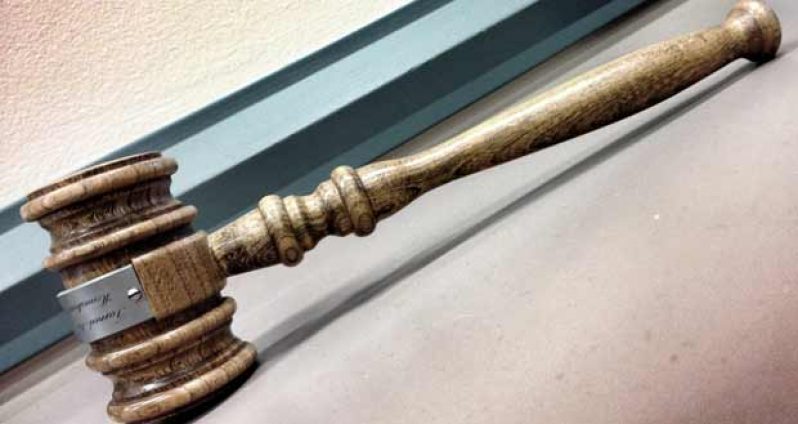BROTHERS Tulsie Persaud and Hansraj Ori were indicted with wounding Bhagwan Singh with intent and were convicted by the jury in 1972 .
They appealed.
Justices of Appeal, Mr. Guya Persaud, Mr. Victor Crane and Mr. J. O. F. Haynes , heard the appeal and set aside the conviction and sentence of both convicts on the ground that there was no evidence on record to show that Tulsie Persaud was acting in concert with his brother, Hansraj Ori .
The Appellate Court held that the trial judge’s direction towards Ori’s alibi defence was too casual a direction and there was need for a further or special direction on onus of proof.
At his jury trial, Hansraj Ori had led an alibi defence which was supported by witnesses but rejected by the jury, following the alleged casual direction by the trial judge.
The Appellate Court had found that although the trial judge had told the jury of their right to acquit the accused if they believed his alibi, the trial judge had also told the jury that they might well think that Hansraj Ori’s evidence served to strengthen the case for the prosecution.
According to the Appellate Court , the appellant Hansraj Ori raised an alibi as his defence, viz. that he was nowhere near the scene of the crime at the time of its commission, and called evidence in support. Neverthelesss, the jury found him guilty because they did not believe him for they were told to acquit him if they did .
On appeal however, a difficulty r arose, in view of too casual a general direction to the jury on the burden of proof. They were told by the trial judge that they might well think that Hansraj Ori’s evidence served to strengthen the case for the prosecution.
The Appellate Court held: (1) that the direction on the burden of proof was so casual that the circumstances called for a further direction or reminder on the burden of proof .
(2) that he jury may well have understood the judge to mean that the prosecution’s case could be strengthened if the accused had lied about his alibi, or had failed to establish it to their satisfaction , and if they so understood, it would have been a grievous wrong to the accused.
The Appellate Court referred to ten cases in the matter.
Mr. G. A. G. Pompey, Deputy Director of Public Prosecutions, appeared for the State.
Mr. K.A Juman-Yasin for the first-named appellant.
Mr. F Ramprashad,S C., for the second-named appellant.
Justice of Appeal Victor Crane delivered the judgment of the Guyana Court of Appeal.
According to the judgment, there was insufficient evidence that the accused, Tulsie Persaud, acted in concert with his brother, the Appellant Hansraj Ori, to assault the complainant, Bhagwan Singh, with intent to cause him grievous bodily harm, or to maim, disfigure or disable him , and it was for that reason on October 25 last, his appeal was allowed and his conviction set aside for that offence, at the same time , decision was reserved in the case of Hansraj Ori.
The prosecution’s case, briefly stated, was that while Tulsie Persaud was doing no more than holding the complainant’s hand and entreating him in a low voice to leave a tent at the wedding reception that was kept on the premises of one Battiejar at No. 2 Canal Polder ,West Bank, Demerara , on the night of April 22, 1972 , the accused Hansraj Ori came up and struck the complainant a savage blow on the left side of his face , with a sturdy piece of wood, causing him to suffer grievous bodily injury.
As indicated above, neither by word nor deed could any nexus be forged between Tulsie Persaud and Hansraj Ori to spell out acting in concert, and for that reason, the court was constrained to allow the former’s appeal.
The defence of Hansraj Ori, however, was based on a different footing, i.e. on an alibi. On oath, he steadfastly maintained that he was nowhere in Canal No.2 on April 22, the date on which the prosecution alleged that he assaulted the complainant.
However, it is right to say that his alibi was supported by one of the prosecution witnesses , a woodcutter named Abdool Shakoor in the respect that he was away at the material time at a place in West Demerara, called Potosi Relief, where both he and Shakoor worked together cutting wood between April and 23, 1972. The alibi was also supported at the trial by his brother , his co-accused Tulsie Persaud , in that he was not at Battiejar’s wedding reception on the night in question, but that it was really he ,Tulsie Persaud, who struck the complainant when the latter attacked him with a rum bottle.
Continuing his , Justice Crane said, “It being then a matter for speculation in the instant case whether the jury got the impression that one of those instances where the case for the prosecution is strengthened, is when an accused has lied about his alibi.
“Nevertheless, it suffices that there has been no attempt to erase by further direction the harm that might have been created in the jury’s minds.”In the light of decided English and West Indian cases , the above direction was too casual and inadequate on the burden of proof on the defence of alibi
“For these reasons, we will allow the appeal of Hansraj Ori and set aside his conviction and sentence”, the court decided.
(By George Barclay)



.jpg)








